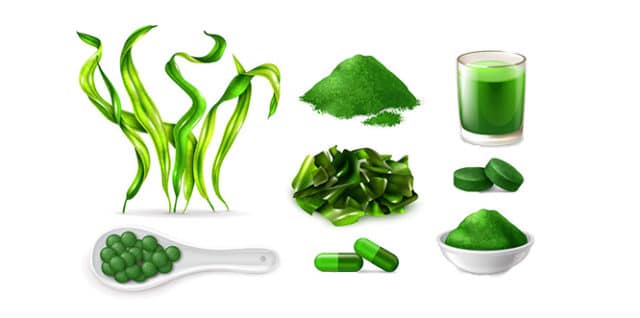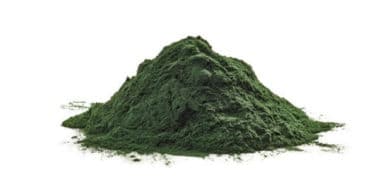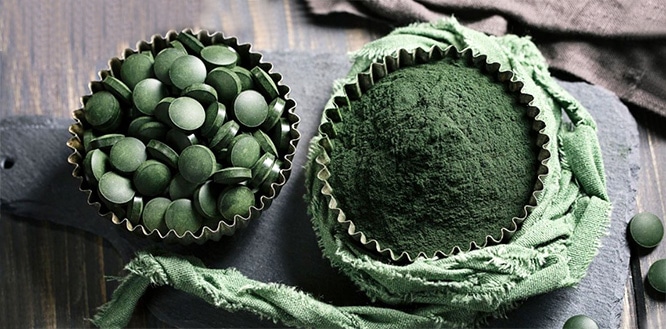Spirulina is blue-green algae that is used as a nutritional supplement. It contains many vitamins and minerals, including high levels of protein, natural iron, vitamin B, and beta carotene. It also contains antioxidants, essential amino acids, chlorophyll and phycocyanobilin (phycocyanin). It is commonly included in vegan diets. Scientific studies show that spirulina is good for many diseases and may have anticancer, antiviral and antiallergic effects. However, you must consult your doctor about whether spirulina supplements are suitable for you and whether they pose a risk with other medications. Some scientific studies show that spirulina is protective against infections caused by influenza and some other viral diseases, especially coronavirus.
Table of Contents
What is Spirulina?
Spirulina (Artospira) is a type of seaweed that can grow in both fresh and salt water. It belongs to the family of single-celled microorganisms (cyanobacteria) called blue-green algae. It has an intense blue-green colour and a soft taste. Its cells do not have hard, fibrous walls and are easily digestible. It is rich in chlorophyll and takes its energy from the sun like a plant.
It is one of the oldest organisms in the world. It was used by the Aztecs in Central America in ancient times. This type of algae, which became popular again when NASA proposed that it could be grown in space for use of astronauts, is considered one of the richest food sources on the planet. (1)
Spirulina is easy to grow, but only seen in alkaline lakes with high pH value and in large outdoor ponds under controlled conditions. The climate of Greece, Japan, India, USA and Spain is ideal for producing this algae.

Spirulina properties
One tablespoon (7 grams) of dried spirulina powder contains:
- Vitamin B1 (thiamine): 11% of the recommended daily dose,
- Vitamin B2 (riboflavin): 15% of the recommended daily dose,
- Vitamin B3 (niacin): 4% of the recommended daily dose,
- Copper: 21% of the recommended daily dose,
- Iron: 11% of the recommended daily dose (2 grams),
- 20 calories and 1.7 g digestible carbohydrates,
- A small amount of fat, including omega-6, omega-3 and omega-9 fatty acids,
- 4.02 gr of protein,
- 8 mg of calcium,
- 14 mg of magnesium,
- 8 mg of phosphorous,
- 95 mg of potassium,
- 73 mg of sodium,
- 0.7 mg of vitamin C.
It also contains almost all nutrients your body needs, such as a small amount of B6 (pyridoxine), B9 (folic acid), vitamins D, A and E, chromium, selenium, zinc.
- The quality of the protein in spirulina is considered excellent. It has a net protein utilization rate of 50-61%.
- The iron contained in spirulina has a highly absorbable form even for those consuming meat.
- The amount of calcium in spirulina is more than 26 times of that included in milk.
- It contains Gamma Linolenic Acid (GLA) which has anti-inflammatory properties. GLA rarely exists in a food and must be produced by the body. It is one of the few foods with natural GLA ingredient.
- Vitamin B12 it contains cannot be absorbed well in the body; therefore, spirulina cannot be considered a good source of vitamin B12.
Benefits of Spirulina
A powerful antioxidant and anti-inflammatory
It is a powerful source of antioxidant with its main active component phycocyanin against oxidative damage. Phycocyanin is the substance that gives spirulina its blue-green colour. This substance fights free radicals, can create antioxidant and anti-inflammatory effects. (2)

Reducing blood pressure levels
A high dose of spirulina can reduce high blood pressure, which is the main risk factor for many diseases, such as heart attack, paralysis and chronic kidney disease. Studies show that a dose of 4.5 grams/d is effective in reducing normal blood pressure levels. (3)
Can lower bad LDL and triglyceride levels
Studies show that it can lower triglycerides and “bad” LDL cholesterol while increasing “good” HDL cholesterol. It can also prevent fat structures in the body from oxidizing and causing damage. Blue-green algae may play a role in preventing heart diseases due to their cholesterol-lowering, anti-inflammatory and antioxidant effects. (4)
Alleviating symptoms of allergic rhinitis
It is a popular alternative treatment method for allergic rhinitis symptoms. It was observed that 2 grams of spirulina taken daily alleviated symptoms like nasal discharge, sneezing, nasal congestion and itching in people with allergic rhinitis. The antiallergic effect of spirulina can be attributed to strengthening the immune system by satisfying the nutritional deficiencies of the body. (5)
Protective against cancer
Studies show that it is somewhat effective, especially against a type of precancerous lesion in the mouth called OSMF (Oral Submucous Fibrosis). Studies on animals show that it can prevent cancer occurrence and reduce tumor size. (6)
Balancing blood sugar
It may help balance blood sugar, and there are studies showing that it is just as effective as diabetes medication in some cases. In animal studies, low blood sugar, higher insulin levels, and improved liver enzyme markers were observed.
There are also studies showing that, while lowering blood sugar levels, it can also reduce HbA1c level, a marker for long-term blood sugar levels. The antioxidant effect of spirulina can also be benefited in patients with Type 1 diabetes. (7)
Helping lose weight
It is a high-nutrious and low-calorie food. It boosts the metabolism and increases the amount of calories burnt. Introducing spirulina to your diet may prevent getting more calories than you need without deterioration in nutrition. (8)
Improving Muscle Strength and Endurance
The antioxidant characteristics of spirulina may help minimize exercise-induced oxidative damage and muscle fatigue. Studies show that it increases endurance and significantly enhances fatigue times.
Good for the bowels
Some studies show that it may help maintain healthy bacteria in your bowels during the aging. As spirulina does not contain much fiber, it is essential to include it with other high-fiber foods in your diet.
Removing toxic substances from the blood
Its chlorophyll content helps remove toxic substances in the blood and boost the immune system. Researchers found that spirulina had properties that could resist toxic substances entering the body such as arsenic, fluoride, iron, lead, and mercury. They also stated that spirulina could be used together with zinc besides clinical treatment of heavy metal poisoning.
Use in anemia treatment
One study suggests that spirulina supplements can increase the hemoglobin content of red blood cells and improve the immune function.
Supporting mental health
Researchers consider spirulina a source of tryptophan and argue that spirulina plays a potential role in treating mood disorders. Tryptophan is an amino acid that supports the serotonin production.
How to use Spirulina?
You can consume spirulina powder directly using a spoon, or sometimes you can add it to beverages like smoothie and mix it into salads, soups, fruit, and vegetable juices. You can swallow spirulina tablets with water.
If you use it especially to lose weight, you can take it approximately twenty minutes before each meal, and after each meal to gain weight. There is not enough scientific data to recommend a dose for spirulina yet, and the daily dose of spirulina may vary depending on factors such as age, gender and medical history.
Types and brands of spirulina
Spirulina is generally available on the market in powder, capsule and tablet form.
Best spirulina supplements
NUTREX HAWAII Pure Hawaiian Spirulina, Solgar, Gano C’Real, Zazzee USDA Organic Spirulina are the most commonly consumed spirulina brands.
How to prepare Gano C’Real Spirulina Oats?
Gano C’Real Spirulina is a food supplement produced by Gano Excel Company with the combination of natural Ganoderma Lucidum mushroom, spirulina micro algae in nature, oats, non-dairy cream and sugar.
It is suitable for the adults and children over the age of 14. It can be consumed in the morning by mixing into a bowl of yogurt or a glass of milk to boost the body.
Optionally, wet or dried fruits or vegetables can be added to increase the nutritional value and increase the feeling of fullness.
Where to buy spirulina and its price
Choosing brands that have received necessary approvals ensures that the product is properly manufactured, contains the ingredients listed on the label, and does not contain harmful contaminants.
Spirulina can be provided from food supplements stores, drug warehouses, or trusted online stores. Spirulina tablets or capsules of different brands are sold between 20-40 USD and spirulina powder packages are sold at a price ranging from 10 USD to 40 USD.
Side effects of Spirulina
- An analysis conducted in 2014 showed that spirulina does not have any significant side effects, as it is well tolerated by most people.
- Spirulina may cause headaches, allergic reactions, muscle pain, sweating and insomnia in some cases.
- Although most of the products on the market are produced in the laboratory, spirulina growing in nature is likely to be affected by microcysts, known to cause liver damage, or environmental pollution, and absorb toxins in water, such as heavy metals.
Who shouldn’t use spirulina?
Spirulina may not be suitable for;
- Those allergic to seafood, seaweed or other sea plants,
- Thyroid patients,
- Those with an autoimmune disease,
- Those with Gout,
- Phenylketonuria (PKU) patients,
- Those with kidney stones,
- Those who take any anticoagulants,
- Pregnant or breastfeeding women.




